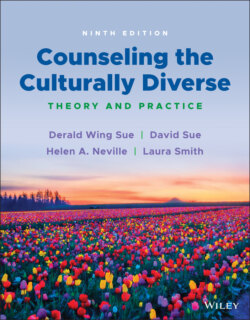Читать книгу Counseling the Culturally Diverse - Laura Smith L. - Страница 75
INSIGHT
ОглавлениеAnother generic characteristic of conventional psychotherapy is the emphasis upon insight. This approach assumes that it is mentally beneficial, if not necessary, for individuals to obtain insight as psychodynamic theory defines it: an understanding into one's own underlying psychological dynamics and motivations (Corey, 2013; Levenson, 2010). Educated in such traditions, many theorists believe that clients who obtain insight into themselves will be better adjusted. Although behavioral schools of thought may not subscribe to this, most therapists work toward insight to some extent in their individual practice, either as a process of therapy or as an end product or goal (Antony & Roemer, 2011).
Therapists must consider that this conception of insight is not shared or highly valued by all cultural communities. A person who does not value insight in the way that Western cultures understand it is not necessarily one who is incapable of insight; rather, many cultural groups do not value this method of self‐exploration. In traditional Chinese society, psychology has little relevance, and a client who does not seem to work well in an insight‐oriented approach may not therefore be lacking in insight itself or psychological‐mindedness. It is interesting to note that many Asian elders believe that thinking too much about something can actually be a source of problems. Many older Chinese believe the way to achieve to mental health is to “avoid morbid thoughts.” Advice from Asian elders to their children when they are frustrated, angry, depressed, or anxious may simply be, “Don't think about it.” Indeed, it is often believed that experiencing anger or depression is related to cognitive rumination. The traditional Asian way of handling these affective elements is to “keep busy and not think about it.” There can be class‐related differences as well (APA Task Force on Socioeconomic Status, 2007). People living in poverty may not perceive additional insight as the solution to their life situations and circumstances. Their immediate concerns may revolve around strategic reality‐oriented questions as “Where do I find a job?,” “How do I feed my family?,” and “How can I afford to take my sick daughter to a doctor?”
